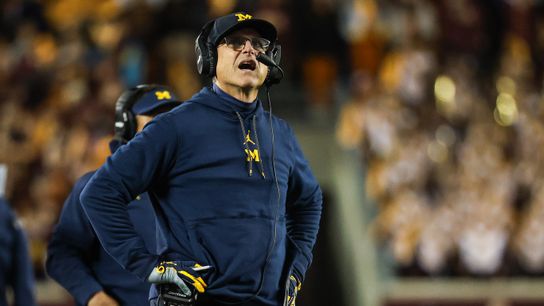Jim Harbaugh is beyond the grasp of the NCAA's enforcement arm. Everyone knows this, including the NCAA.
The Committee on Infractions will not touch Michigan's 2023 national championship no matter the outcome of the ongoing Connor Stalions investigation, and therefore the storybook ending to Harbaugh's 9-year run at his alma mater is secure. At age 60 and with more money than God in the bank, Harbaugh is incredibly unlikely to ever return to the college game no matter the outcome of his LA Chargers tenure.
"The way I see it, from Coach Harbaugh's perspective, today's COI decision is like being in college and getting a letter from your high school saying you're suspended because you didn't sign the yearbook," Harbaugh's lawyer Tom Mars said Wednesday.
Mars isn't wrong, but he's also missing the point.
Harbaugh's punishment isn't about Harbaugh, it's about the rest of the coaching profession that doesn't have an NFL head coaching position and an $80 million contract to secure him from consequences.
In the NCAA's mind, Harbaugh committed the most unpardonable of sins: not the provision of impermissible benefits and failure to promote an atmosphere of compliance, but not being forthright with the NCAA.
Don't take my word for it. The NCAA's announcement says so itself:
Harbaugh's violations of the COVID-19 recruiting dead period are Level II violations, but his unethical conduct and failure to cooperate with the membership's infractions process — specifically, his provision of false or misleading information — is a Level I violation.
The 48-page findings say that, "When asked specific questions about his knowledge of and involvement in impermissible recruiting contacts during the COVID-19 recruiting dead period, Harbaugh provided vague responses or outright denied knowledge of or involvement in the conduct. Given the significant amount of reasonable, credible information in the record, Harbaugh's denials are not credible. The panel concludes that these denials resulted in a Level I violation of Bylaws 10 and 19."
The cover-up has always been worse than the crime in the NCAA's justice system, particularly because the organization lacks the subpoena power of the actual justice system. The Committee on Infractions regularly encourages -- if not begs -- schools to work in concert toward mediated resolutions. Those who refuse to cooperate, and/or are outright deceptive, get the full course of whatever punishment the NCAA still has the power to levy.
In a day and age where the rules are changing, the courts and public opinion are tearing larger shreds in the NCAA's authority by the day, the COI is going to drop the hammer whenever and wherever it still can.
And make no mistake: this is a career-ending punishment for anyone other than Jim Harbaugh:
During the show-cause order, Harbaugh would be barred from all athletically related activities, including team travel, practice, video study, recruiting and team meetings, at any NCAA school that employed him. Additionally, if hired during the show-cause order, Harbaugh would be suspended for 100 percent of the first season of employment.
No other coach is getting hired if an NCAA-mandated condition of their employment is that they a barred from "all athletically related activities" including travel, practice, video study, recruiting and team meetings for four years and they're suspended for 100 percent of their first season of employment. (If someone can explain the difference between "suspended for 100 percent of the first season" and "barred from all athletically related activities," I'm all ears. Seems like hiring a chef who's allowed to do anything except be around food at that point.)
This is the NCAA sending a message to every coach in every other NCAA sport that they still can and will end the career of any coach who commits violates whatever rules are still on the books and, worse, misleads, obfuscates and lies about it.
